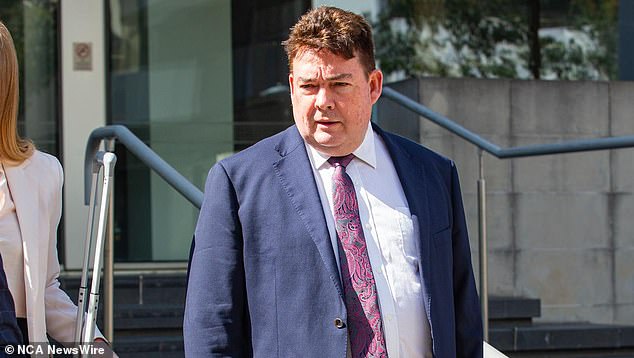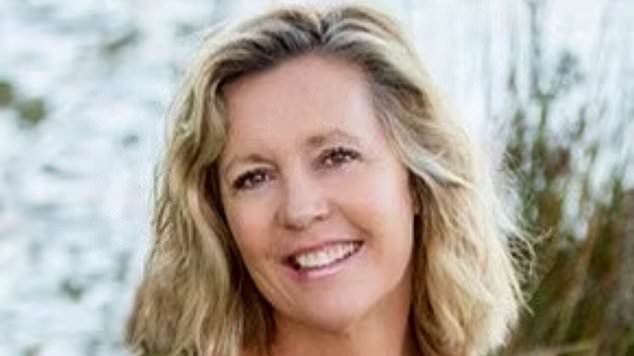Australian influencer who allegedly killed his mother for money was bankrupt months before arrest, court told
A man accused of killing his mother to make money from life insurance policies he took out on her declared bankruptcy after her death, a court has been told.
The WA Supreme Court was told Andre Zachary Rebelo portrayed a life of luxury on social media with his defacto model Grace Piscopo, but the prosecutor argued he was in debt while trying to fund a ‘plastic’ lifestyle with credit cards and personal loans.
Rebelo is on trial for the murder of his mother Colleen Rebelo, who was found dead in her Bicton home on May 25, 2020. He has pleaded not guilty.
He is said to have taken out three life insurance policies against his mother in the week before her death and started the claims process to access the premiums just days after her death.
He prosecuted one of the claims for $500,000, submitting forged documents to expedite the insurer’s payout.
The court was told the insurer suspected the claim was fraudulent and reported it to police.
The jury heard that Mr Rebelo pleaded guilty to fraud but denied killing his mother.
The financial position of Rebelo and Ms Piscopo was revealed in court on Tuesday, revealing that Rebelo had barely any money in his savings account a month after Ms Rebelo was found dead in her home.
Public prosecutor Brett Tooker (pictured) told the WA Supreme Court that Andre Zachary Rebelo stood to make $1.15 million from life insurance policies he took out on his mother a week before her death.
WA Police Financial Crime Squad investigator Darren Stammers examined the couple’s financial records over a three-year period from June 2018 to June 2020.
He told the court on Tuesday that the couple had a combined income of about $339,000, earned largely through Ms Piscopo’s modeling career over the three years, but a month after Ms Rebelo’s death the couple had no savings, with a combined debt of $112,000 .
The couple had credit cards and personal loans, which they increased over the three years, as well as Afterpay and ZipPay accounts, adding to their financial burden, Mr Stammers said.

The WA Supreme Court was told Andre Zachary Rebelo and Gracie Piscopo had scant savings and debts of about $112,000, about a month after Colleen Rebelo was found dead in her home. The former couple is pictured together
Rebelo was being pursued by debt collectors and the couple had missed rent and car payments for a Range Rover eVoque that Ms Piscopo bought with a personal loan in 2018.
Rebelo was declared bankrupt in March 2022 and was arrested about eight months later, the court heard.
Mr Stammers said it was fair to say Mr Rebelo was in financial difficulties, likely to be exacerbated by Covid.
“Especially from 2019 onwards when he defaulted on credit card and personal loan repayments and was subject to recovery measures,” he said.
“Mr Rebelo’s sources of income, whether employment or self-employment, were lower than the Australian average and were likely insufficient to cover his expenses.
“As a result, he spent more money than he earned and the debts he incurred.”

The financial records of Grace Piscopo and her former defacto Andre Rebelo, who is accused of killing his mother Colleen Rebelo to make money from life insurance policies he took out against her, were examined by a WA Police Financial Crime Squad investigator. The former couple is pictured together
Mr Stammers told the court that Ms Piscopo was quite successful with modeling and social media activities, which generated a significant amount of money over the three-year period.
He said Ms. Piscopo has spent money as part of her social media profile, buying a car with borrowed money and taking out a credit card that she has struggled to pay back.
He told the court the couple had also moved into a rental property together at a ‘fairly significant cost’ of $880 a week.
“While her income was significantly higher than Mr. Rebelo’s, their overall expenses were at a level that prevented them from saving or contributing to debt.
‘I think the coronavirus has had a big impact on her.
‘To be fair, they were in a difficult financial position at various points.
“If you compare their income and expenditure in June 2020, it is clear that their expenditure exceeded their income.
“Their situation deteriorated from December 2019 to June 2020.”

Lawyer Anthony Elliott (pictured) put it to the financial investigator that looking at the couple’s finances retrospectively to find out what their income would be in the future was not the best indicator
Attorney Anthony Elliott argued that looking at the couple’s financial position with the benefit of hindsight was not the best indicator of what income would come in the future.
He said setting aside the couple’s credit card and personal loan meant they were meeting their financial obligations, but the financial investigator disagreed.
Mr. Stammers said they had defaulted on car payments and rent, and were delinquent on their credit cards and personal loans.
But Mr Elliott argued that late rent and car payments were quickly resolved.
He put it to Mr Stammers that it was possible that the couple had borrowed money to finance their social media business, and said that in order to keep their business going at the end of 2019, they would have to get money from somewhere.
Mr. Stammers responded that a significant amount of money was spent on luxury goods that he believed were items for Ms. Piscopo’s social media profile.
“I don’t know exactly what the underlying goods were, but there were a lot of luxury purchases,” says Stammers.

Colleen Rebelo (pictured) was found dead at her home in the Perth suburb of Bicton in May 2020. Authorities were unable to determine how the 58-year-old woman died suddenly
The jury heard that while Ms Rebelo’s death was sudden and unexpected, it was not treated as suspicious by the first responders who were called to her home when she died.
Medical experts, including Ms Rebelo’s GP, Dr Niall Barrett, and endocrinologist Timothy Welborn, both gave evidence at the trial and told the court Ms Rebelo was healthy when she died.
Both witnesses said it was unlikely that Ms Rebelo died suddenly from the medical conditions she was living with at the time of her death.
Forensic pathologist Dr. Reimar Junkerstorff, who performed an autopsy on her body, was unable to determine Ms. Rebelo’s cause of death, despite additional tests.
Dr. Junkerstorff told the court he could not rule out that Ms Rebelo died of asphyxiation or was smothered.
Rebelo’s defense team argued that traces of focal subendocardial interstitial fibrosis on Ms Rebelo’s heart meant she could have died from cardiac arrhythmias, causing her to suddenly collapse and die.
The process continues.
